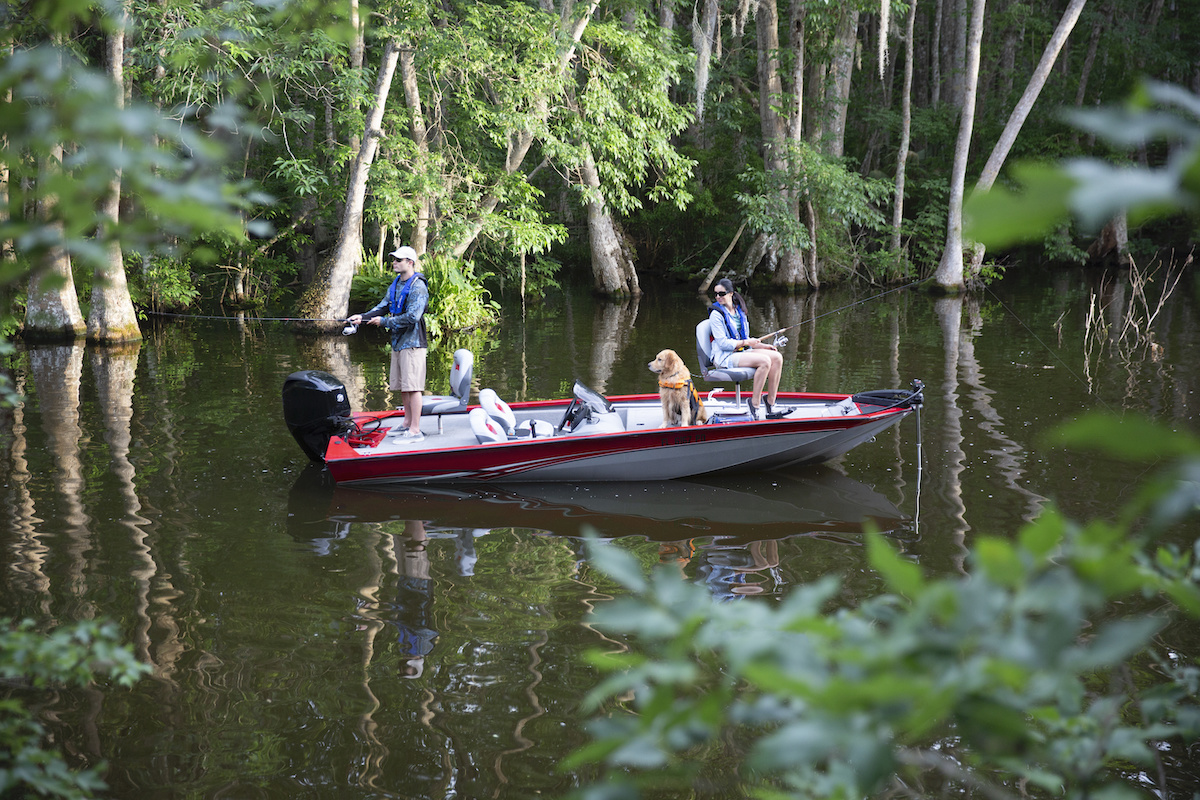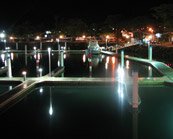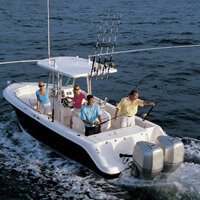No matter what sort of boat you may want to consider buying, a visit to our Boat Finder tool is sure to prove helpful. If you’ve narrowed your search to fishing boats, however, you’ll notice that there are many different types to choose from. Which would be most ideal for you and your family? What are the most important criteria to keep in mind? Before we dig into these questions, let’s take a brief look at the different options available, and the basic steps to follow when buying a fishing boat.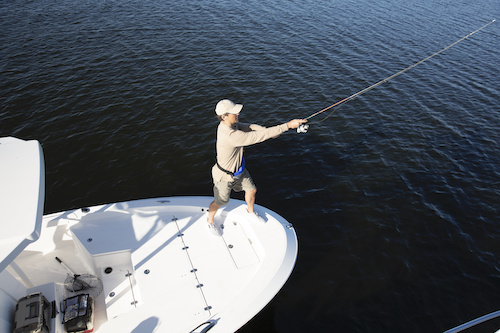
Buying a Fishing Boat: Step-by-Step
- Do your research—explore the different types of fishing boats available.
- Determine how and where you plan to use your fishing boat.
- Narrow down your list of potentials, weigh the advantages and disadvantages of each type.
- Consider features you'll need: number of rod holders, baitwells, outriggers, tackle boxes, casting deck, etc.
- Decide on the right fishing boat for your lifestyle, and close the deal.
For additional details on where to shop for a boat, how to work with a local boat dealer, and exactly how to close the deal, be sure to follow the steps outlined by our Ultimate Boat Buyer's Guide. In the meantime, start your research by exploring different types of fishing boats.
Explore All-Purpose Fishing Boats
Types of Fishing Boats
All-Purpose Fishing Boats: Versatile models are available in both aluminum and fiberglass, and since they aren’t specialized for a particular style or type of fishing, they allow for lots of experimentation and flexibility.
Aluminum Fishing Boats: Rugged, adaptable, and often surprisingly inexpensive, aluminum fishing boats are one of the most popular types on the water, especially for people who need to choose among relatively small boats.
Bass Boats: Bass boats are highly evolved fishing machines. If you plan to target bass, bass, and more bass, choosing one is a no-brainer. Just remember that they’re very specialized and don’t allow for much flexibility.
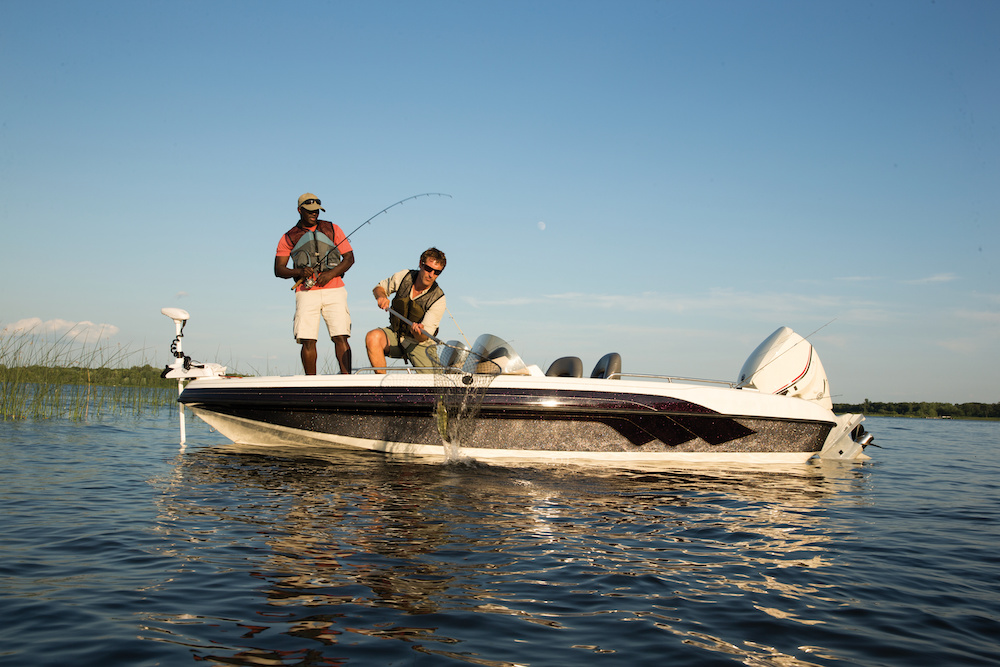
Bay Boats/Flats Boats: Anglers who want to probe inshore saltwater bays and flats will love this genre of boat. It’s another type that’s designed for fairly specific environments, however, and there are also many “hybrid” models on the market which blur the lines between different types of fishing.
Center Consoles: When it comes to all-around fishability in different environments, a center console fishing boat is tough to beat. Some are designed more or less for different types of fishing and/or sea conditions, but the basic design works for most anglers across the board.
Deck Boats: Though deck boats are more commonly seen in versions designed for watersports or lounging, there are plenty of fishing models out there, too. Most often, they’re targeted towards casual anglers who enjoy boating activities other than fishing, as well.
Fish-and-Ski Boats: These boats are exactly what the name infers: a cross between a boat designed for watersports, and one meant for fishing. They aren’t necessarily ideal for either sport but most are more than competent for both activities.
Motor Yachts/Power Cruisers: Most of us don’t think of motor yachts or power cruisers as perfect for fishing, and truth be told most aren’t. We’ve included them here in our list, however, because there are some boats of these types out there which are designed to offer basic fishing abilities.
Multi-Hull Powerboats (Power Catamarans): Power catamarans aren’t necessarily fishing boats, but most on today’s market are in fact designed for anglers. That’s because a multi-hull’s strongest suit is the ability to take on rough seas, and many saltwater anglers like to go fishing no matter how hard it’s blowing.
Pontoon Boats: While you could cast a line from just about any pontoon boat, many manufacturers offer fishing-centric models which are awesome for taking the family fishing on a lake or bay.
Sportfishing Yachts: When it comes to deep-sea fishing well beyond the sight of land, a sportfishing yacht is the ultimate option.
Walkarounds: With a cabin enclosing the bow, walkarounds are often the choice of dedicated anglers who fish when the weather is foul. They’re also a top pick for family anglers with small children, who may need a break from the action now and again.
Advantages & Disadvantages of Different Types of Fishing Boats
As is true of many things in life, the more specialized a boat is the less versatile it becomes. This is a huge consideration to take into account when you consider buying a fishing boat. And it factors into the decision in more ways than one, because some boats are finely-honed to accommodate specific fishing techniques or species, while others are designed for specific types of waterways.
Take those bass boats, for example. They will be the ultimate when you’re casting spinnerbaits along the shoreline, jigging over a submerged point, or running at high speeds from hotspot to hotspot on a sprawling reservoir. But if you decide you’d like to try trolling for walleye in a river or go drift-fishing for flounder in the bay, that bass boat will prove less than ideal in either scenario.
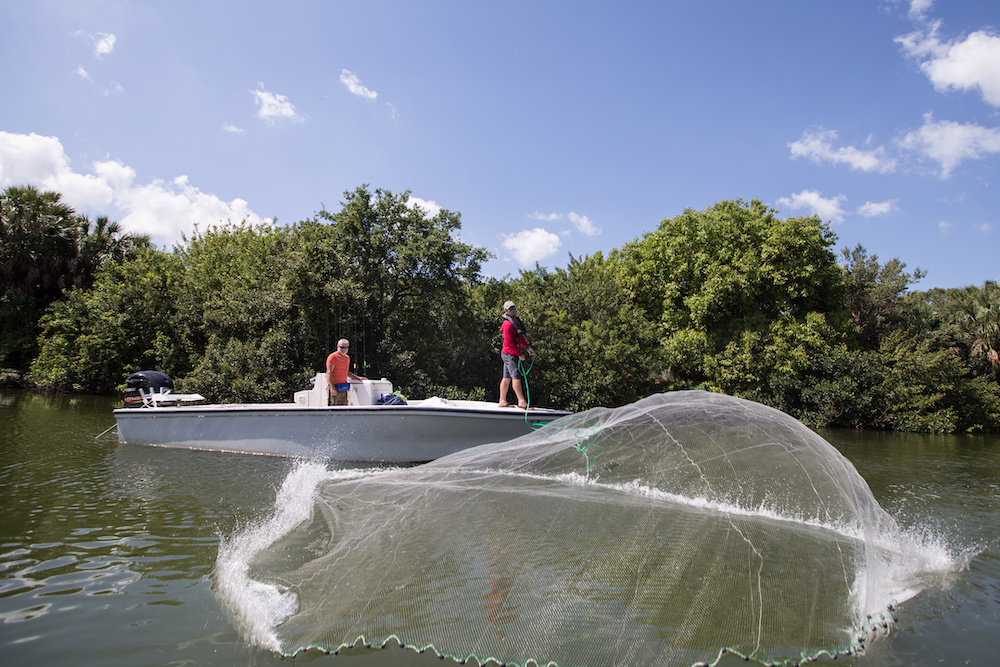
The same is true of boats intended to tackle different types of waters. While a big center console with a wave-splitting deep-V hull may be the right choice for an angler who wants to fish in the open ocean, the deeper draft it requires make the same boat unable to probe flats and shallow back-country waterways.
The bottom line? You need to ask yourself how and where you’d like to fish, before you can decide which is the right fishing boat to buy. The more specific your answer is the most specific the boat can be. And on the flip side of the coin, the more eclectic your fishing interests are, the more versatile a boat you’ll want to choose.
Specific Factors to Consider
Once you’ve narrowed your focus to a particular genre of fishing boat, it’s time to get down to brass tacks and consider some specific features. Again, which are most important to you will depend on how and where you like to fish. Some of the most important to consider include:
- The number and placement of fishing rod holders, especially if you like to troll multiple lines and/or haul lots of different rods.
- The size and capacity of the baitwell or multiple wells, if you enjoy live-baiting.
- The size and capacity of livewells, a must-have in order to participate in certain catch-and-release tournaments.
- The size and capacity of the fishboxes and/or on-board coolers, if you plan to have your catch for dinner.
- The presence of specialized gear like outriggers (for offshore fishing), downriggers and downrigger ball holders (for deep-water trolling), or electric reel plugs (for kite fishing and deep-dropping).
- The number and placement of built-in tackleboxes.
- The presence of elevated casting decks and/or a spotting station, if sight-fishing is in your plans.
As you do your search for the perfect fishing boat, always remember that in truth there’s no such thing. There are always trade-offs to be made—you can’t place a downrigger mount where there’s a flush gunwale holder, and you can’t integrate tackleboxes into a leaning post of limited size if you decide there needs to be a big livewell in that spot. All you can do is search among the many options to try to find the fishing boat that’s ideal for you, personally, and your family. Once you find it, you’ll never again have to ponder how to buy a fishing boat. At least, not until you decide to upgrade.
Read Next: Best Deep Sea & Offshore Fishing Boats
You Might Also Like:
- When is the Best Time to Go Fishing?
- 10 Best Fishing Trips for Your Bucket List
- Fishing Safety Tips & Safety Gear
- 10 Best Fishing Apps for Your Smartphone
- Explore Saltwater Fishing Boats
- Explore Freshwater Fishing Boats
